考研备考英语阅读突破——理解作者态度
考研备考英语阅读突破——理解作者态度
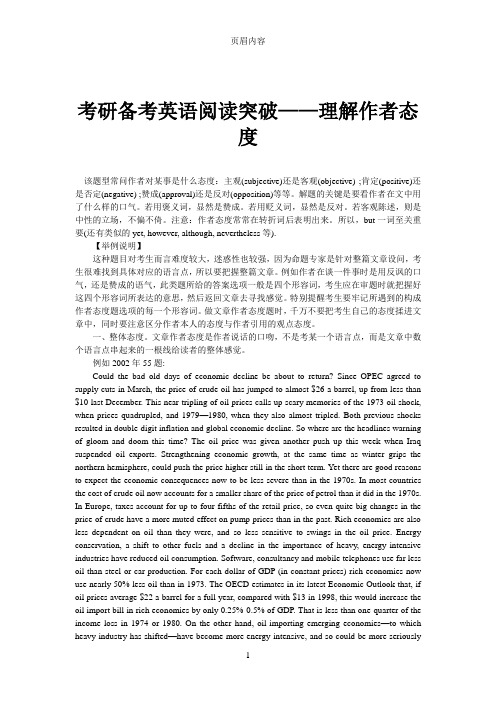
考研备考英语阅读突破——理解作者态度该题型常问作者对某事是什么态度:主观(subjective)还是客观(objective) ;肯定(positive)还是否定(negative) ;赞成(approval)还是反对(opposition)等等。
解题的关键是要看作者在文中用了什么样的口气。
若用褒义词,显然是赞成。
若用贬义词,显然是反对。
若客观陈述,则是中性的立场,不偏不倚。
注意:作者态度常常在转折词后表明出来。
所以,but一词至关重要(还有类似的yet, however, although, nevertheless等).【举例说明】这种题目对考生而言难度较大,迷惑性也较强,因为命题专家是针对整篇文章设问,考生很难找到具体对应的语言点,所以要把握整篇文章。
例如作者在谈一件事时是用反讽的口气,还是赞成的语气,此类题所给的答案选项一般是四个形容词,考生应在审题时就把握好这四个形容词所表达的意思,然后返回文章去寻找感觉。
特别提醒考生要牢记所遇到的构成作者态度题选项的每一个形容词。
做文章作者态度题时,千万不要把考生自己的态度揉进文章中,同时要注意区分作者本人的态度与作者引用的观点态度。
一、整体态度。
文章作者态度是作者说话的口吻,不是考某一个语言点,而是文章中数个语言点串起来的一根线给读者的整体感觉。
例如2002年55题:Could the bad old days of economic decline be about to return? Since OPEC agreed to supply-cuts in March, the price of crude oil has jumped to almost $26 a barrel, up from less than $10 last December. This near-tripling of oil prices calls up scary memories of the 1973 oil shock, when prices quadrupled, and 1979—1980, when they also almost tripled. Both previous shocks resulted in double-digit inflation and global economic decline. So where are the headlines warning of gloom and doom this time? The oil price was given another push up this week when Iraq suspended oil exports. Strengthening economic growth, at the same time as winter grips the northern hemisphere, could push the price higher still in the short term. Yet there are good reasons to expect the economic consequences now to be less severe than in the 1970s. In most countries the cost of crude oil now accounts for a smaller share of the price of petrol than it did in the 1970s. In Europe, taxes account for up to four-fifths of the retail price, so even quite big changes in the price of crude have a more muted effect on pump prices than in the past. Rich economies are also less dependent on oil than they were, and so less sensitive to swings in the oil price. Energy conservation, a shift to other fuels and a decline in the importance of heavy, energy-intensive industries have reduced oil consumption. Software, consultancy and mobile telephones use far less oil than steel or car production. For each dollar of GDP (in constant prices) rich economies now use nearly 50% less oil than in 1973. The OECD estimates in its latest Economic Outlook that, if oil prices average $22 a barrel for a full year, compared with $13 in 1998, this would increase the oil import bill in rich economies by only 0.25%-0.5% of GDP. That is less than one-quarter of the income loss in 1974 or 1980. On the other hand, oil-importing emerging economies—to which heavy industry has shifted—have become more energy-intensive, and so could be more seriously1squeezed. One more reason not to lose sleep over the rise in oil prices is that, unlike the rises in the 1970s, it has not occurred against the backbone of general commodity-price inflation and global excess demand. A sizable portion of the world is only just emerging from economic decline. The Economist’s commodity price index is broadly unchanging from a year ago. In 1973 commodity prices jumped by 70% and in 1979 by almost 30%.From the text we can see that the writer seems.[A] optimistic[B] sensitive[C] gloomy[D] scared本段开头用设问句引出问题,再通过严谨地分析,结合数字的对比,得出乐观的结论。
阅读理解中的态度观点题解析

阅读理解中的态度观点题解析阅读理解是英语考试中常见的题型之一,而其中的态度观点题则是较为常见且较为具有挑战性的一类。
这类题目要求考生通过阅读材料,理解作者的态度和观点,并根据文中的线索进行推断和判断。
下面将对阅读理解中的态度观点题解析进行探讨。
一、理解态度观点题在阅读理解中,要正确理解作者的态度和观点,首先要对文中的内容进行准确的理解。
通常,我们可以通过以下几个方面的线索来推断作者的态度和观点:1.情感色彩:作者对某一主题或议题表达的情感色彩通常会透露出他们的态度。
例如,如果作者在文中使用了赞扬、赞美的词语,那么作者的态度很可能是肯定的;而如果作者使用了批评、谴责的词语,那么作者的态度可能是否定的。
2.修辞手法:作者在表达观点时常常会使用一些修辞手法,例如比喻、夸张等。
通过分析这些修辞手法,我们可以推断出作者的态度和观点。
3.语气和语调:作者在写作中的语气和语调也可以透露出他们的态度。
例如,如果作者的语气相对客观而中立,那么作者可能持中立的态度;如果作者的语气较为激烈和强烈,那么作者可能持强烈的态度。
二、解题方法与技巧在解答阅读理解中的态度观点题时,可以采用以下方法和技巧:1.仔细阅读文章:在阅读文章时,要仔细阅读每一段落,并注意作者表达观点的细节和线索。
特别要注意文章中出现的情感色彩、修辞手法、语气和语调等。
2.分析选项:在看完文章后,再细读题目和选项,并针对每个选项进行分析。
排除与作者态度和观点相反的选项,留下与作者态度和观点相符合的选项。
3.细读原文:留下的选项中,选择最能概括作者观点和态度的选项,然后再回到原文中找到与之相对应的句子或段落,进行仔细核对。
4.注意选项中的程度词:有时候,选项中的程度词可以帮助我们推断作者的态度。
例如,如果选项中出现了"never"、"always"等词语,那么作者的态度很可能是绝对的;如果选项中出现了"usually"、"often"等词语,那么作者的态度很可能是相对的。
考研英语四六级阅读理解作者态度观点信号词寻找以及常见态度词汇集锦附小测试一题

常见观点态度词语小测试:positive favorable(dis)approvalsupportive defensive negativeobjection critical oppositionobjective subjective optimisticindifferent compromising uninterestedquestioning disappointed concernedneutral cautious pessimisticbiased suspicious doubtful态度观点信号词:论点:认为,相信:argue , argument , believe , suppose, think , be convinced that [相信] , hold the belief that … , have a notion that …, view…as , regard….as , see…as, consider….to be, reckon [算作,设想],论据: for example , for instance , specifically, take… as an examplelike , such as … , Imagine …. ,调查研究:investigation , inquiry [hold an inquiry into a case对一个案子进行调查]research, study, survey, report , questionnaire[调查问卷],measurement ,调查研究结果:得出结论:conclude th at … ,come to a conclusion that …. ,draw a conclusion that …表明,发现:show , suggest , demonstrate , manifest [清楚地显示或表示]display, find , find out, discover, reveal , proveindicate, imply,预测、预报、预言:forecast , foretell, foresee, predict表示赞同:agree, appreciate意识到, 懂得, approve赞成、批准, consent to同意表示反对:against , disagree, disapprove, dissent from, object to ,be opposed to反对表示事实:belief , fact , reality, truth表示理论,设想:assumption , theory, hypothesis [假设]表示目的:to do, aim at, for the sake of , for , serve as, in favor of [有利于],for the purpose of, intend to do ,论据中常见专家名称:expert , specialist , professor , associate professor [副教授],sociologist [社会学家],economist, linguist[语言学家],consultant [顾问] psychologist [心理学家],behaviorist [行为学家],philosopher[哲学家] , anthropologist [人类学家],archaeologist [考古学家]逻辑信号词-路标词1,表示因果的原因:后接句子--- Because, since , as , for后接词组--- because of , thanks to由于,多亏, owing to 由于, 因...之缘故, due to , as a result of 作为结果,by/in virtue of [由于]* The movie touched me by virtue of its story.结果:so(that), accordingly[因此];as a result; consequently; for this(that)reason; hence; therefore此外:表因果的特色词汇比如A 是因,B是果:Greenhouse effect is responsible for weather changeA account for / be responsible for BA cause / lead to / result in / bring about / bring on / trigger /give rise to B2,表示转折的“但是,然而”:but , however; yet , nevertheless, whereas“尽管,虽然”:后接句子--- although , though, even though , while ,#notwithstanding后接词组--- despite; in spite of“相反地”:conversely[相反地] ; on the contrary;“另一方面”:on the other hand;3,表示比较的by comparison ; in contrast (相比之下); in the same way; similarly4,表示递进的also; besides; furthermore; in addition; in particular(特别地)more importantly; moreover; What’s more5,表示概括的in brief; in conclusion; in short; in a word , in sum; to sum up; on the whole , to conclude6.表示并列:and , or , at the same time, meanwhile , as well as一、态度词汇总1.积极:approving 赞许的,,optimistic 乐观的, sympathetic 同情的, consent 赞成2.消极:negative否定的,消极的,反面的,pessimistic 悲观的,apprehensive 忧虑的,reserved 有保留的,内向的,arbitrary武断的, biased有偏见的,偏心的, partial 不公平的, critical 持批评态度的, depressing 令人沮丧的,disappointing令人失望的, doubtful怀疑的,object反对, be opposed to/opposing反对的, scared惊恐的,panick恐慌, sensitive敏感的,subjective主观的, suspicious怀疑的3.中性:objective 客观的,impartial 公平的, unbiased公正的4. 情绪:anger愤怒, indignant 愤怒的r, happy高兴的, contempt轻视, gloomy沮丧的5.其它:surprized惊奇的, amazed惊奇的, puzzled迷惑的, ambiguous模棱两可的, neutral 中立的,indifferent漠不关心的, subjective 主观的6.对态度的修饰词:reserved有保留的, cautiously谨慎地, enthusiatic热烈的, strong强烈的, radical激进的二、态度词分析1.可能的态度:考研阅读考的的态度有两种,一种是作者,另一是非作者的其它人。
2021考研英语阅读解题关键-文章主旨+作者态度

2021考研英语阅读解题关键:文章主旨+作者态度主旨和作者的态度是一篇文章的灵魂,把握这两条脉络对于理清整篇文章的结构以及解题至关重要,这也是读懂考研阅读的第一步。
一、文章主旨文章主旨考查的是考生对中心思想的理解,考查内容可分为对文章中心和段落中心的考查。
由考研文章本身的特点所决定,其难度不高,但解答的正确与否却相当关键,直接决定着本篇文章其他试题的解答。
因此,此类试题一般属于必得分点。
段落中心句往往位于段首或者段末,或体现段落的观点(有say,argue,must,should等标志词),或体现段落的逻辑关系(对比和递进的逻辑关系为主)。
●解题思路标志:best title main idea main problem conclusion mainly discuss mainly deal with或者问作者的写作目的purpose the author intends to do sth a digest of利用宏观阅读技巧作主旨题,不管是出现在什么位置,都把他作为最后一题来做。
方法:(1)段落少,用串线法。
串线法是在解文章中心时,使用最多,最有效的方法,此方法要求考生能够将该篇文章每个段落的中心句串在一起,总结概括之后得出文章中心。
通常情况下,正确答案中一定会涵盖文章的关键词(中心词),且正确答案具有抽象、高度概括的特点,不涵盖绝对的肯定或否定的说法。
而错误选项仅仅代表了文章的局部信息,或范围过宽。
(2)快速作文法:两个选项难以分辨的时候,用这两个选项做作文,快速给出纲。
(3)选项不能选择局部信息,也不能选范围过宽的信息。
二、作者态度对作者态度的判断是构成阅读理解的两条宏观主线之一。
因此,正确辨明作者对所叙述事物的态度,不仅关系到本类题型的解答,也潜在地影响到其他问题的正确解答。
这类题目主要是从作者文中描述事物所用到的形容词、副词和动词等表达感情色彩的词汇或语句入手,尤其是系表结构的语句。
考研英语阅读态度题词汇汇总
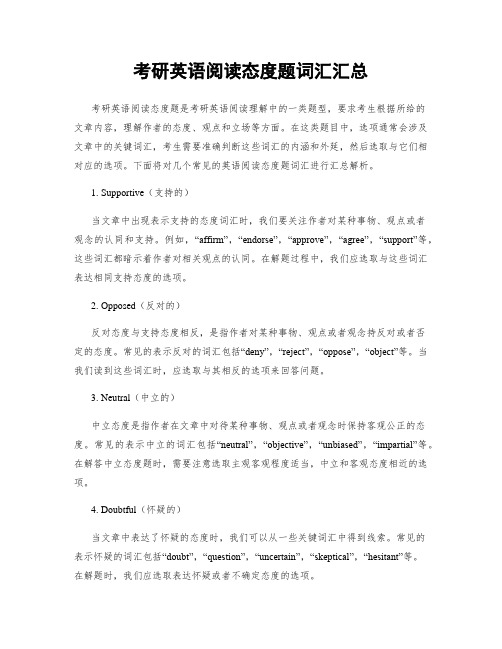
考研英语阅读态度题词汇汇总考研英语阅读态度题是考研英语阅读理解中的一类题型,要求考生根据所给的文章内容,理解作者的态度、观点和立场等方面。
在这类题目中,选项通常会涉及文章中的关键词汇,考生需要准确判断这些词汇的内涵和外延,然后选取与它们相对应的选项。
下面将对几个常见的英语阅读态度题词汇进行汇总解析。
1. Supportive(支持的)当文章中出现表示支持的态度词汇时,我们要关注作者对某种事物、观点或者观念的认同和支持。
例如,“affirm”,“endorse”,“approve”,“agree”,“support”等,这些词汇都暗示着作者对相关观点的认同。
在解题过程中,我们应选取与这些词汇表达相同支持态度的选项。
2. Opposed(反对的)反对态度与支持态度相反,是指作者对某种事物、观点或者观念持反对或者否定的态度。
常见的表示反对的词汇包括“deny”,“reject”,“oppose”,“object”等。
当我们读到这些词汇时,应选取与其相反的选项来回答问题。
3. Neutral(中立的)中立态度是指作者在文章中对待某种事物、观点或者观念时保持客观公正的态度。
常见的表示中立的词汇包括“neutral”,“objective”,“unbiased”,“impartial”等。
在解答中立态度题时,需要注意选取主观客观程度适当,中立和客观态度相近的选项。
4. Doubtful(怀疑的)当文章中表达了怀疑的态度时,我们可以从一些关键词汇中得到线索。
常见的表示怀疑的词汇包括“doubt”,“question”,“uncertain”,“skeptical”,“hesitant”等。
在解题时,我们应选取表达怀疑或者不确定态度的选项。
5. Optimistic(乐观的)/Pessimistic(悲观的)当文章中表达了对于某种事物、观点或者观念的乐观或者悲观态度时,我们需要从相关词汇中寻找线索。
常见的表示乐观态度的词汇有“optimistic”,“hopeful”,“positive”等;表示悲观态度的词汇有“pessimistic”,“negative”,“doubtful”等。
考研英语阅读理解观点态度题解析
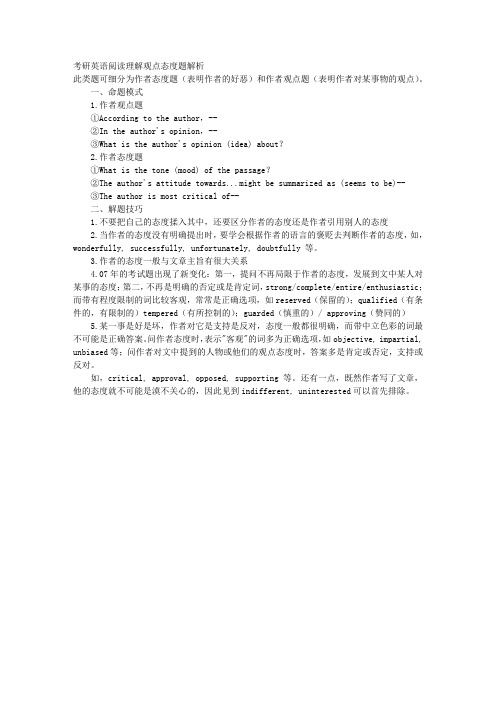
考研英语阅读理解观点态度题解析此类题可细分为作者态度题(表明作者的好恶)和作者观点题(表明作者对某事物的观点)。
一、命题模式1.作者观点题①According to the author,--②In the author's opinion,--③What is the author's opinion (idea) about?2.作者态度题①What is the tone (mood) of the passage?②The author's attitude towards...might be summarized as (seems to be)--③The author is most critical of--二、解题技巧1.不要把自己的态度揉入其中,还要区分作者的态度还是作者引用别人的态度2.当作者的态度没有明确提出时,要学会根据作者的语言的褒贬去判断作者的态度,如,wonderfully, successfully, unfortunately, doubtfully 等。
3.作者的态度一般与文章主旨有很大关系4.07年的考试题出现了新变化:第一,提问不再局限于作者的态度,发展到文中某人对某事的态度;第二,不再是明确的否定或是肯定词,strong/complete/entire/enthusiastic;而带有程度限制的词比较客观,常常是正确选项,如reserved(保留的);qualified(有条件的,有限制的)tempered(有所控制的);guarded(慎重的)/ approving(赞同的)5.某一事是好是坏,作者对它是支持是反对,态度一般都很明确,而带中立色彩的词最不可能是正确答案。
问作者态度时,表示"客观"的词多为正确选项,如objective, impartial, unbiased等;问作者对文中提到的人物或他们的观点态度时,答案多是肯定或否定,支持或反对。
完成英语阅读理解中的态度观点和目的意图题

完成英语阅读理解中的态度观点和目的意图题英语阅读理解中的态度观点和目的意图题是考察学生对文章中作者态度、观点以及写作目的的理解能力。
在解答这类题目时,我们需要仔细阅读文章,理解作者的观点和态度,并分析作者的写作目的。
下面我将从这三个方面展开论述。
首先,理解作者的态度是解答态度观点题的关键。
作者的态度可以通过他的言辞和表达方式来体现。
例如,如果作者使用了一些负面的词语或者表达方式,那么可以判断他对某个事物或者观点持有否定态度。
相反,如果作者使用了一些正面的词语或者表达方式,那么可以判断他对某个事物或者观点持有肯定态度。
此外,作者的态度还可以通过对事实的解释和评论来判断。
在解答态度观点题时,我们要综合考虑文章的语言风格、词语选择以及作者对事物的评价,从而准确把握作者的态度。
其次,理解作者的观点是解答观点题的关键。
观点题要求我们判断作者对某个问题或者观点的看法。
在解答这类题目时,我们需要通过对文章的细节进行分析,找出作者对该问题或者观点的观点表达。
通常,作者的观点会在文章的开头或者结尾进行明确陈述,也可能通过对事实的解释和评论来间接表达。
我们需要仔细阅读文章,理解作者对该问题或者观点的立场,并通过对文章的细节进行分析,找出支持作者观点的证据。
最后,理解作者的写作目的是解答目的意图题的关键。
写作目的是指作者写作的目的和意图。
在解答这类题目时,我们需要通过对文章的整体结构和内容进行分析,找出作者写作的目的和意图。
通常,作者的写作目的可以通过对文章的主题和中心思想进行分析得出。
此外,我们还可以通过对文章的语言风格、词语选择以及作者对事物的评价进行分析,找出作者写作的目的和意图。
综上所述,完成英语阅读理解中的态度观点和目的意图题需要我们仔细阅读文章,理解作者的态度、观点和写作目的。
通过对文章的语言风格、词语选择以及作者对事物的评价进行分析,我们可以准确把握作者的态度、观点和写作目的。
在解答这类题目时,我们需要综合考虑文章的细节和整体结构,从而准确回答问题。
轻松应对考研英语阅读理解态度题合集1篇
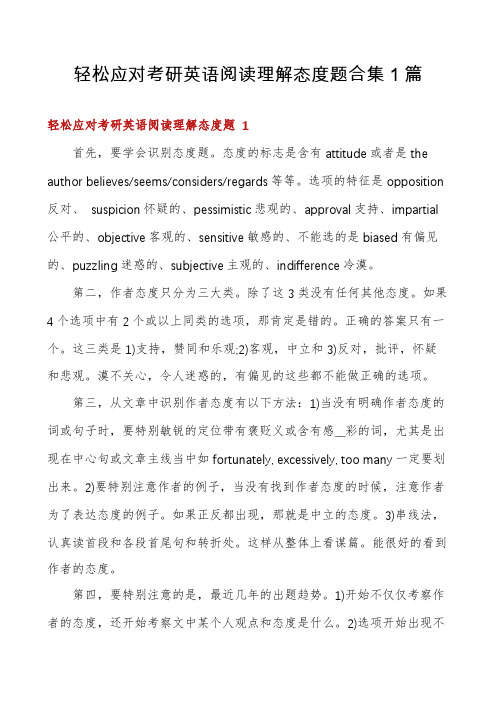
轻松应对考研英语阅读理解态度题合集1篇轻松应对考研英语阅读理解态度题 1首先,要学会识别态度题。
态度的标志是含有attitude或者是the author believes/seems/considers/regards等等。
选项的特征是opposition 反对、suspicion怀疑的、pessimistic悲观的、approval支持、impartial 公平的、objective客观的、sensitive敏感的、不能选的是biased有偏见的、puzzling迷惑的、subjective主观的、indifference冷漠。
第二,作者态度只分为三大类。
除了这3类没有任何其他态度。
如果4个选项中有2个或以上同类的选项,那肯定是错的。
正确的答案只有一个。
这三类是1)支持,赞同和乐观;2)客观,中立和3)反对,批评,怀疑和悲观。
漠不关心,令人迷惑的,有偏见的这些都不能做正确的选项。
第三,从文章中识别作者态度有以下方法:1)当没有明确作者态度的词或句子时,要特别敏锐的定位带有褒贬义或含有感__彩的词,尤其是出现在中心句或文章主线当中如fortunately, excessively, too many一定要划出来。
2)要特别注意作者的例子,当没有找到作者态度的时候,注意作者为了表达态度的例子。
如果正反都出现,那就是中立的态度。
3)串线法,认真读首段和各段首尾句和转折处。
这样从整体上看谋篇。
能很好的看到作者的态度。
第四,要特别注意的是,最近几年的出题趋势。
1)开始不仅仅考察作者的态度,还开始考察文中某个人观点和态度是什么。
2)选项开始出现不再是态度明确的肯定或否定的`词,而改为带有程度限制的词语。
比如reserved(有保留的),tempered(温和的,缓和的)因为持有保留态度的观点比较客观。
3)一般带有绝对化或过于强烈的词修饰的选项一定是错的。
此外,就历年真题而言,大家可以参考英语(一)1998年62题,1999年54题,2002年55题,2003年58题,2004年52,55题来一起练习下这个做题技巧。
英语阅读题的情感态度题

英语阅读题的情感态度题在英语阅读理解题中,情感态度题是考察学生对文章作者情感态度的理解和把握。
以下是一些可能的题型和相应的答题策略:1. 理解作者的情感态度- 题型:What is the author's attitude towards [topic]?- 答题策略:注意文章中的形容词、副词、动词和短语,这些词汇往往带有情感色彩。
例如,positive, negative, optimistic, pessimistic 等。
2. 区分作者与文中人物的情感态度- 题型:How does the author differ from [character] in terms of attitude towards [topic]?- 答题策略:仔细阅读文章中作者和特定人物的观点和描述,注意两者之间的差异。
3. 识别情感态度的转变- 题型:How does the author's attitude change throughout the passage?- 答题策略:跟踪文章中情感态度的线索,注意作者在不同段落中的观点变化。
4. 推断作者的隐含情感- 题型:What can be inferred about the author's feelings regarding [topic]?- 答题策略:除了直接表达的情感词汇外,作者可能会通过隐喻、比喻、反讽等手法表达情感,需要仔细分析。
5. 评价作者的情感态度- 题型:Evaluate the author's attitude towards [topic].- 答题策略:不仅要识别作者的情感态度,还要评价其合理性、一致性等。
6. 比较不同作者的情感态度- 题型:Compare the attitudes of the authors in [text A] and [text B].- 答题策略:阅读两篇文章,找出各自作者的情感态度,并进行比较。
2020考研英语:阅读常见作者态度词汇总

2020考研英语:阅读常见作者态度词汇总英语要想考高分,阅读题部分必须拿下,如果这部分答的不理想,你很有可能过不了线。
今天整理了考研英语阅读常见作者态度词汇总,希望对大家有所帮助。
1.肯定的常见态度词有:positive adj.肯定的,实际的,积极的,确实的favorable adj.赞成的,有利的,赞许的,良好的approval n. 赞成,承认,正式批准enthusiasm n.狂热,热心,积极性supportive adj.支持的,支援的defensive adj.为而辩护2.否定消极的常见态度词有:negative adj.否定的,消极的,负的,阴性的disapproval adj.不赞成、objection 异议opposition n.反对、critical 批评的criticism n.批评批判、disgust vi令人厌恶,令人反感detestation n.憎恶,厌恶的人,嫌恶indignation n.愤慨contempt n.轻视,轻视,耻辱,不尊敬compromising n.妥协,折衷v.妥协,折衷worried adj.闷闷不乐的,焦虑的skeptical adj.怀疑3.客观中立的常见态度词有:objective adj.客观的neutral adj.中立的impartial adj.公平的,不偏不倚的disinterested adj.无私的unprejudiced adj.没有偏见的unbiased adj.没有偏见的unprejudiced adj.公平的,无偏见的,没有成见的detached adj. 不含个人偏见的。
考研英语阅读理解解题技巧和方法

考研英语阅读理解解题技巧和方法考研英语阅读理解解题技巧1. 例证题:①例证题的标记。
当题干中出现example,case, illustrate, illustration, exemplify 时。
②返回原文,找出该例证所在的位置,即给该例子定位。
③搜索该例证周围的区域,90%向上,10%向下,找出该例证支持的观点。
例子周围具有概括抽象性的表达通常就是它的论点。
注意:举例的目的是为了支持论点或是为了说明主题句。
举例后马上问这个例子说明了什么问题?不能用例子中的话来回答这个问题。
④找出该论点,并与四个选项比较,得出选项中与该论点最一致的答案。
⑤例证题错误答案设计的干扰特征经常是:就事论事。
即用例子中的某一内容拉出来让你去选。
(╳)要求:在阅读中,遇到长的例子,立即给这个例子定位,即找出起始点,从哪开始到哪结束。
2. 指代题:①返回原文,找出出题的指代词。
②向上搜索,找最近的名词、名词性短语或句子(先从最近点开始找,找不到再找次近的,一般答案不会离得太远)。
③将找到的词、词组或句子的意思代入替换该指代词,看其意思是否通顺。
④将找到的词、词组或句子与四个选项进行比较,找出最佳答案。
3. 词汇题:“搜索代入”法①返回原文,找出该词汇出现的地方。
②确定该词汇的词性。
③从上下文(词汇的前后几句)中找到与所给词汇具有相同词性的词(如一下子找不到就再往上往下找),代入所给词汇在*中的位置(将之替换)看语义是否合适。
④找出选项中与代替词意思相同或相近的选相,即答案。
注意:a.如果该词汇是简单词汇,则其字面意思必然不是正确答案。
b.考研阅读不是考察字认识不认识,而是考察是否能根据上下文作出正确的判断。
c.词汇题的正确答案经常蕴藏在原文该词汇出现的附近。
注意不能靠单词词义直接往下推。
d.寻找时要注意同位语、特殊标点(比如分号,分号前后两句话的逻辑关系不是形式上的并列就是语义上的并列,也就是两句话的意思相同,所以可用其中一句话的意思来推测另一句话的意思从而推出所给词汇含义)、定语从句、前后缀,特别要注意寻找时的同性原则。
英语阅读理解得分秘籍-理解作者的意图
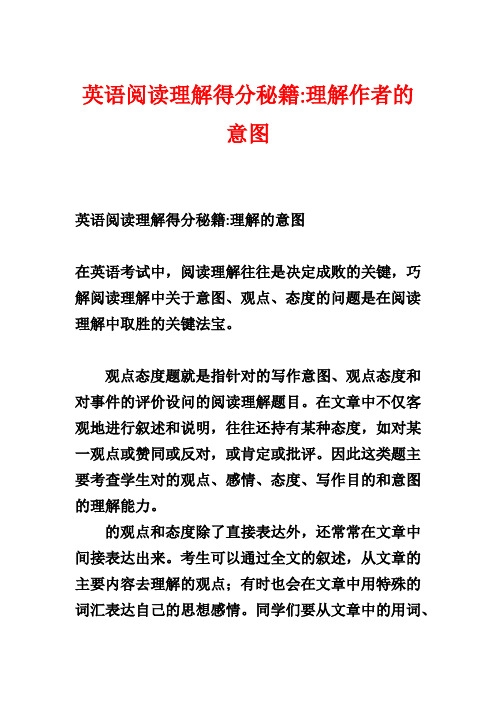
英语阅读理解得分秘籍:理解作者的意图英语阅读理解得分秘籍:理解的意图在英语考试中,阅读理解往往是决定成败的关键,巧解阅读理解中关于意图、观点、态度的问题是在阅读理解中取胜的关键法宝。
观点态度题就是指针对的写作意图、观点态度和对事件的评价设问的阅读理解题目。
在文章中不仅客观地进行叙述和说明,往往还持有某种态度,如对某一观点或赞同或反对,或肯定或批评。
因此这类题主要考查学生对的观点、感情、态度、写作目的和意图的理解能力。
的观点和态度除了直接表达外,还常常在文章中间接表达出来。
考生可以通过全文的叙述,从文章的主要内容去理解的观点;有时也会在文章中用特殊的词汇表达自己的思想感情。
同学们要从文章中的用词、语气或对某个细节的陈述来推断的态度、观点等。
观点态度题的题干形式:态度观点题考查目标比较明确,题干一般都含有according to the writer, attitude, opinion, believe, consider, regard等词或短语。
这类题目除了考查在整篇文章中所表现的态度和写作意图外,有的还考查对具体的某个人或事物的态度或评价。
观点态厦题的'题干主要有以下几种形式:1) What is the purpose of the text?/The purposeof the passage is to .2) What is the opinion of the writer in this passage?3) Whats the au thors attitude towards…?4) Who are the intended readers of the passage?5) What does the author mean by saying …?6) From the…paragraph, what do you think the author wants to tell us?观点态度题的解题方法:的态度和立场一般分为三大类:支持、赞同、乐观;客观、中立;反对、批评、怀疑、悲观。
英语阅读理解观点态度类题答题策略
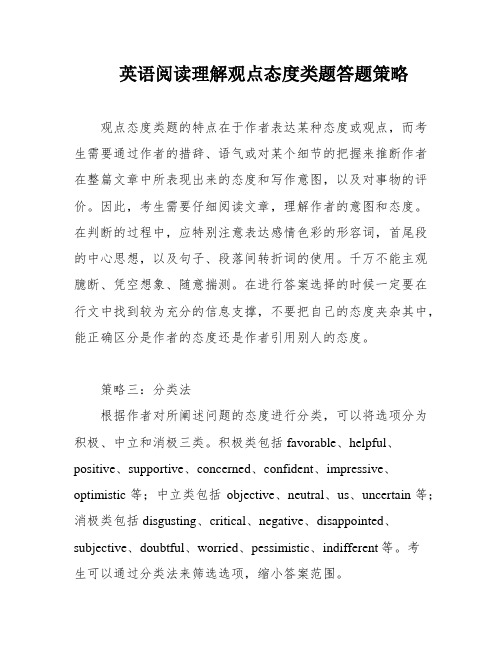
英语阅读理解观点态度类题答题策略观点态度类题的特点在于作者表达某种态度或观点,而考生需要通过作者的措辞、语气或对某个细节的把握来推断作者在整篇文章中所表现出来的态度和写作意图,以及对事物的评价。
因此,考生需要仔细阅读文章,理解作者的意图和态度。
在判断的过程中,应特别注意表达感情色彩的形容词,首尾段的中心思想,以及句子、段落间转折词的使用。
千万不能主观臆断、凭空想象、随意揣测。
在进行答案选择的时候一定要在行文中找到较为充分的信息支撑,不要把自己的态度夹杂其中,能正确区分是作者的态度还是作者引用别人的态度。
策略三:分类法根据作者对所阐述问题的态度进行分类,可以将选项分为积极、中立和消极三类。
积极类包括favorable、helpful、positive、supportive、concerned、confident、impressive、optimistic等;中立类包括objective、neutral、us、uncertain等;消极类包括disgusting、critical、negative、disappointed、subjective、doubtful、worried、pessimistic、indifferent等。
考生可以通过分类法来筛选选项,缩小答案范围。
策略四:把握文章主旨根据文章的主题,考生也可进行大方向的判断。
故事类记叙文的目的通常是娱乐读者(XXX);广告类应用文的目的一般是推销产品或服务(to persuade或to advertise);议论文的目的要阐述论点(to argue);科普、文化类说明文的目的大多是介绍知识,使大家广闻博见(to inform)。
因此,考生可以通过把握文章主旨来推断作者的态度和观点。
总之,观点态度类题需要考生仔细阅读文章,理解作者的意图和态度,通过分类法、把握文章主旨等策略来推断作者的态度和观点,从而选择正确的答案。
英语阅读理解观点态度题解题技巧

英语阅读理解观点态度题解题技巧英语阅读理解是学习英语的重要环节之一,而观点态度题是其中的一种常见题型。
解答观点态度题需要我们准确理解文章的观点和态度,同时掌握一些解题技巧。
本文将为您介绍一些解答观点态度题的技巧和注意事项。
一、理解文章的观点和态度在解答观点态度题之前,首先需要准确理解文章的观点和态度。
观点指的是作者或文章对某一事物或现象的看法或立场,而态度则是指文章表达观点的情感色彩或情感倾向。
为了准确理解文章的观点和态度,我们可以从以下几个方面入手:1. 注意关键词:观点和态度通常会通过一些关键词或词组来表达,比如"believe"(相信)、"support"(支持)、"oppose"(反对)等。
注意这些关键词的出现,可以帮助我们把握观点和态度。
2. 分析修饰语:观点和态度还常常会通过修饰语来体现,比如"strongly"(强烈地)、"positively"(积极地)、"unfortunately"(不幸地)等。
分析这些修饰语可以进一步了解文章的情感色彩或情感倾向。
3. 推理作者意图:有时候,文章没有明确表达观点和态度,这时我们可以根据文章的内容进行推理,来推测作者的意图和立场。
可以分析文章中的事实、例子、比较等来进行推理。
二、解题技巧解答观点态度题时,我们可以借助以下一些技巧:1. 寻找态度转折词:有时候,文章会在不同段落或句子中表达相反的观点或态度。
这时我们可以通过寻找其中的转折词,比如"however"(然而)、"but"(但是)、"although"(虽然)等,来确定不同观点或态度的出现位置。
2. 留意文章结尾:有时候,作者会在文章结尾明确表达自己的观点和态度,这可以帮助我们更准确地判断。
3. 注意上下文逻辑关系:观点和态度往往是基于文章的上下文逻辑关系而言的,我们可以通过分析上下文中事实、例子、论证等来推断观点和态度。
英语阅读理解中的态度与观点分析
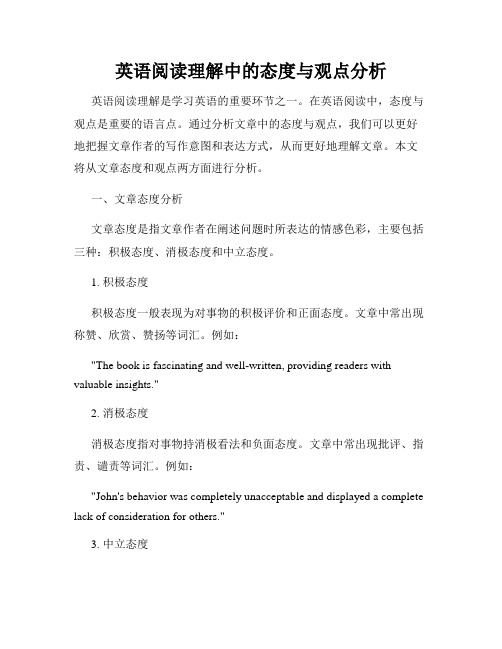
英语阅读理解中的态度与观点分析英语阅读理解是学习英语的重要环节之一。
在英语阅读中,态度与观点是重要的语言点。
通过分析文章中的态度与观点,我们可以更好地把握文章作者的写作意图和表达方式,从而更好地理解文章。
本文将从文章态度和观点两方面进行分析。
一、文章态度分析文章态度是指文章作者在阐述问题时所表达的情感色彩,主要包括三种:积极态度、消极态度和中立态度。
1. 积极态度积极态度一般表现为对事物的积极评价和正面态度。
文章中常出现称赞、欣赏、赞扬等词汇。
例如:"The book is fascinating and well-written, providing readers with valuable insights."2. 消极态度消极态度指对事物持消极看法和负面态度。
文章中常出现批评、指责、谴责等词汇。
例如:"John's behavior was completely unacceptable and displayed a complete lack of consideration for others."3. 中立态度中立态度是指对事物持中立看法和中性态度。
文章中常出现客观性强的描述和说明。
例如:"The article presents a balanced view of the issue, providing readers with relevant information and multiple perspectives."二、文章观点分析文章观点是文章作者对问题的看法,是作者在文章中联系现实表达自己的思想观点。
文章观点一般可以分为三类:支持观点、反对观点和中立观点。
1. 支持观点支持观点是指文章作者对某一观点或者事物采取赞同态度和支持立场。
文章中常出现认为、相信、支持等词汇。
例如:"The author argues that studying abroad can be an eye-opening experience, expanding one's worldview and cultural understanding."2. 反对观点反对观点是指作者对某一观点或者事物持否定态度和反对立场。
考研备考英语二阅读态度题解题原则
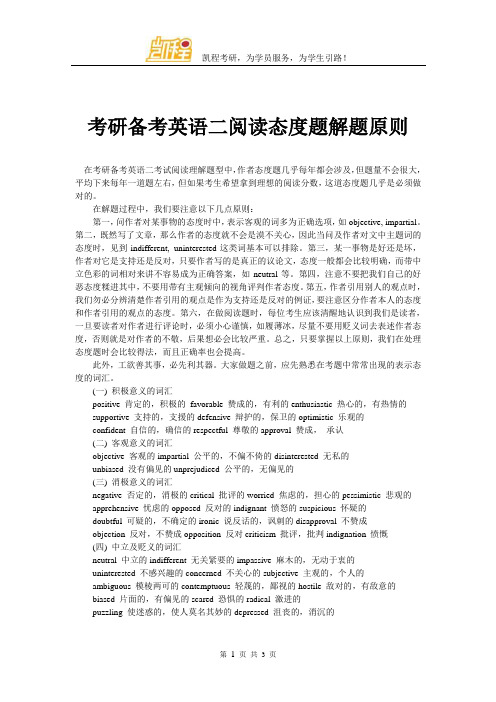
考研备考英语二阅读态度题解题原则在考研备考英语二考试阅读理解题型中,作者态度题几乎每年都会涉及,但题量不会很大,平均下来每年一道题左右,但如果考生希望拿到理想的阅读分数,这道态度题几乎是必须做对的。
在解题过程中,我们要注意以下几点原则:第一,问作者对某事物的态度时中,表示客观的词多为正确选项,如objective, impartial。
第二,既然写了文章,那么作者的态度就不会是漠不关心,因此当问及作者对文中主题词的态度时,见到indifferent, uninterested这类词基本可以排除。
第三,某一事物是好还是坏,作者对它是支持还是反对,只要作者写的是真正的议论文,态度一般都会比较明确,而带中立色彩的词相对来讲不容易成为正确答案,如neutral等。
第四,注意不要把我们自己的好恶态度糅进其中,不要用带有主观倾向的视角评判作者态度。
第五,作者引用别人的观点时,我们勿必分辨清楚作者引用的观点是作为支持还是反对的例证,要注意区分作者本人的态度和作者引用的观点的态度。
第六,在做阅读题时,每位考生应该清醒地认识到我们是读者,一旦要读者对作者进行评论时,必须小心谨慎,如履薄冰,尽量不要用贬义词去表述作者态度,否则就是对作者的不敬,后果想必会比较严重。
总之,只要掌握以上原则,我们在处理态度题时会比较得法,而且正确率也会提高。
此外,工欲善其事,必先利其器。
大家做题之前,应先熟悉在考题中常常出现的表示态度的词汇。
(一) 积极意义的词汇positive 肯定的,积极的favorable 赞成的,有利的enthusiastic 热心的,有热情的supportive 支持的,支援的defensive 辩护的,保卫的optimistic 乐观的confident 自信的,确信的respectful 尊敬的approval 赞成,承认(二) 客观意义的词汇objective 客观的impartial 公平的,不偏不倚的disinterested 无私的unbiased 没有偏见的unprejudiced 公平的,无偏见的(三) 消极意义的词汇negative 否定的,消极的critical 批评的worried 焦虑的,担心的pessimistic 悲观的apprehensive 忧虑的opposed 反对的indignant 愤怒的suspicious 怀疑的doubtful 可疑的,不确定的ironic 说反话的,讽刺的disapproval 不赞成objection 反对,不赞成opposition 反对criticism 批评,批判indignation 愤慨(四) 中立及贬义的词汇neutral 中立的indifferent 无关紧要的impassive 麻木的,无动于衷的uninterested 不感兴趣的concerned 不关心的subjective 主观的,个人的ambiguous 模棱两可的contemptuous 轻蔑的,鄙视的hostile 敌对的,有敌意的biased 片面的,有偏见的scared 恐惧的radical 激进的puzzling 使迷惑的,使人莫名其妙的depressed 沮丧的,消沉的凯程教育:凯程考研备考成立于2005年,国内首家全日制集训机构考研备考,一直从事高端全日制辅导,由李海洋教授、张鑫教授、卢营教授、王洋教授、杨武金教授、张释然教授、索玉柱教授、方浩教授等一批高级考研备考教研队伍组成,为学员全程高质量授课、答疑、测试、督导、报考指导、方法指导、联系导师、复试等全方位的考研备考服务。
考研英语阅读判定作者态度的三大方法

在考研英语阅读理解题型中,作者态度题每年都会涉及,题量不会很⼤,基本每次⼀题。
能否正确把握作者态度对于⽂章的整体理解是⾄关重要的。
1.标志:attitude 2.作者的态度只分为三种:⽀持或赞同;中⽴或客观;怀疑、批评或反对 3.判定作者态度的⽅法 A)寻找带有作者强烈感情⾊彩的名词、动词、形容词或者副词来判定作者态度。
如2009年⼤纲样题(1996年真题)“The growth of the limited liability company and municipal business had important consequences. Such large, impersonal manipulation of capital and industry greatly increased the numbers and importance of shareholders as a class, an element in national life representing irresponsible (不负责任的,明显是⼀个贬义词,作者就是批判股东的)wealth detached from the land and the duties of the landowners; and almost equally detached from the responsible management of business.”“Fortunately,(幸运的,明显后⾯连接的是作者⽀持的,即⾏业公会起了⼀个好的作⽤)however, the increasing power and organisation of the trade unions, at least in all skilled trades, enabled the workmen to meet on equal terms the managers of the companies who employed them.” 61. According of the passage, all of the following are true except that ________. [A] the shareholders were unaware of the needs of the workers [B] the old firm owners had a better understanding of their workers [C] the limited liability companies were too large to run smoothly [D] the trade unions seemed to play a positive role (⾏业公会扮演了⼀个积极的⾓⾊) 62. The author is most critical of ________. [A] family firm owners [B] landowners [C] managers [D] shareholders (批判股东) B)段⾸句中含有“but, yet, however, in fact”类表⽰强转折关系的词时,这句话通常表征作者观点。
考研阅读理解态度题

阅读理解态度题瞬间秒杀技巧在阅读理解的作者态度题中:/如果选项表述的态度过于强烈或过于负面,比如悲观(pessimistic/gloomy)、恐惧(scared)、蔑视/嘲笑(contempt/scornful/disdainful)、绝望(desperate)、有害(harmful/destructive)、自以为是(conceited)、讽刺(sarcastic)等,不是答案。
/如果选项表述困惑(confused/puzzled)、漠不关心(indifference/indifferent)、不确定(uncertain/ambiguous)、犹豫(hesitancy)等,不是答案。
因为作者必须表明一个明确的态度,不能模棱两可。
/如果选项表述偏见(biased),不是答案。
/如果选项表述容忍(tolerant/tolerance/permissive/indulgence),不是答案。
/如果选项表述支持(supportive)、欣赏(appreciation/appreciative)、满意(satisfaction/desirable)、肯定(positive)等,通常不是答案。
/如果选项表述怀疑(suspicion/skeptical/doubtful/questionable)、乐观(optimistic)、同情(sympathy)、客观(objective/impartial)、赞同(approval/consent)等,通常是答案。
(注:此处“怀疑”是针对全文中局部内容的怀疑,如果是针对全文的怀疑,则不是答案)第一/1.客观理性原则某一事物是好是坏,作者对它是支持、反对还是中立,态度一般都非常明确。
问作者对某事物的态度时,表示“客观”的词多为正确选项(事物是客观存在的)。
如objective,impartial,unbiased等。
问作者对其提到的某人的观点的态度时,答案只能是肯定或否定,支持或反对。
- 1、下载文档前请自行甄别文档内容的完整性,平台不提供额外的编辑、内容补充、找答案等附加服务。
- 2、"仅部分预览"的文档,不可在线预览部分如存在完整性等问题,可反馈申请退款(可完整预览的文档不适用该条件!)。
- 3、如文档侵犯您的权益,请联系客服反馈,我们会尽快为您处理(人工客服工作时间:9:00-18:30)。
考研备考英语阅读突破——理解作者态度该题型常问作者对某事是什么态度:主观(subjective)还是客观(objective) ;肯定(positive)还是否定(negative) ;赞成(approval)还是反对(opposition)等等。
解题的关键是要看作者在文中用了什么样的口气。
若用褒义词,显然是赞成。
若用贬义词,显然是反对。
若客观陈述,则是中性的立场,不偏不倚。
注意:作者态度常常在转折词后表明出来。
所以,but一词至关重要(还有类似的yet, however, although, nevertheless等).【举例说明】这种题目对考生而言难度较大,迷惑性也较强,因为命题专家是针对整篇文章设问,考生很难找到具体对应的语言点,所以要把握整篇文章。
例如作者在谈一件事时是用反讽的口气,还是赞成的语气,此类题所给的答案选项一般是四个形容词,考生应在审题时就把握好这四个形容词所表达的意思,然后返回文章去寻找感觉。
特别提醒考生要牢记所遇到的构成作者态度题选项的每一个形容词。
做文章作者态度题时,千万不要把考生自己的态度揉进文章中,同时要注意区分作者本人的态度与作者引用的观点态度。
一、整体态度。
文章作者态度是作者说话的口吻,不是考某一个语言点,而是文章中数个语言点串起来的一根线给读者的整体感觉。
例如2002年55题:Could the bad old days of economic decline be about to return? Since OPEC agreed to supply-cuts in March, the price of crude oil has jumped to almost $26 a barrel, up from less than $10 last December. This near-tripling of oil prices calls up scary memories of the 1973 oil shock, when prices quadrupled, and 1979—1980, when they also almost tripled. Both previous shocks resulted in double-digit inflation and global economic decline. So where are the headlines warning of gloom and doom this time? The oil price was given another push up this week when Iraq suspended oil exports. Strengthening economic growth, at the same time as winter grips the northern hemisphere, could push the price higher still in the short term. Yet there are good reasons to expect the economic consequences now to be less severe than in the 1970s. In most countries the cost of crude oil now accounts for a smaller share of the price of petrol than it did in the 1970s. In Europe, taxes account for up to four-fifths of the retail price, so even quite big changes in the price of crude have a more muted effect on pump prices than in the past. Rich economies are also less dependent on oil than they were, and so less sensitive to swings in the oil price. Energy conservation, a shift to other fuels and a decline in the importance of heavy, energy-intensive industries have reduced oil consumption. Software, consultancy and mobile telephones use far less oil than steel or car production. For each dollar of GDP (in constant prices) rich economies now use nearly 50% less oil than in 1973. The OECD estimates in its latest Economic Outlook that, if oil prices average $22 a barrel for a full year, compared with $13 in 1998, this would increase the oil import bill in rich economies by only 0.25%-0.5% of GDP. That is less than one-quarter of the income loss in 1974 or 1980. On the other hand, oil-importing emerging economies—to which heavy industry has shifted—have become more energy-intensive, and so could be more seriouslysqueezed. One more reason not to lose sleep over the rise in oil prices is that, unlike the rises in the 1970s, it has not occurred against the backbone of general commodity-price inflation and global excess demand. A sizable portion of the world is only just emerging from economic decline. The Economist’s commodity price index is broadly unchanging from a year ago. In 1973 commodity prices jumped by 70% and in 1979 by almost 30%.From the text we can see that the writer seems.[A] optimistic[B] sensitive[C] gloomy[D] scared本段开头用设问句引出问题,再通过严谨地分析,结合数字的对比,得出乐观的结论。
据此,我们可得知作者的态度从总体上是乐观的,积极的,故A为正确答案。
二、局部作者态度题,此类题目考查考生对局部细节所体现出的作者态度的理解,因此做此类题时,考生不能再像前一种态度题一样去找“感觉”,而应当回到文章局部上,落到实处。
例如1996年62题:In the last half of the nineteenth century, “capital”and “labour”were enlarging and perfecting their rival organizations on modern lines. Many an old firm was replaced by a limited liability company with a bureaucracy of salaried managers. The change met the technical requirements of the new age by engaging a large professional element and prevented the decline in efficiency that so commonly spoiled the fortunes of family firms in the second and third generation after the energetic founders. It was moreover a step away from individual initiative, towards collectivism and municipal and state-owned business. The railway companies, though still private business managed for the benefit of shareholders, were very unlike old family business! At the same time the great municipalities went into business to supply lighting, trams and other services to the taxpayers. The growth of the limited liability company and municipal business had important consequences. Such large, impersonal manipulation of capital and industry greatly increased the numbers and importance of shareholders as a class, an element in national life representing irresponsible wealth detached from the land and the duties of the landowners; and almost equally detached from the responsible management of business. All through the nineteenth century, America, Africa, India, Australia and parts of Europe were being developed by British capital, and British shareholders were thus enriched by the world's movement towards industrialization. Towns like Bournemouth and E astbourne sprang up to house large “comfortable” classes who had retired on their incomes, and who had no relation to the rest of the community except that of drawing dividends and occasionally attending a shareholders’ meeting to dictate their orders to t he management. On the other hand “shareholding” meant leisure and freedom which was used by many of the later Victorians for the highest purpose of a great civilization. The “shareholders” as such had no knowledge of the lives, thoughts or needs of the wor kmen employed by the company in which they held shares, and their influence on the relations of capital and labour was not good. The paid manager acting for the company was in more direct relation with the men and their demands, but even he had seldom that familiar personal knowledge of the workmen which the employer had often had under the more patriarchal system of the old family business now passing away. Indeed the mere size of operations and the numbers of workmen involved rendered such personal relations impossible. Fortunately, however, the increasing powerand organization of the trade unions, at least in all skilled trades, enabled the workmen to meet on equal terms the managers of the companies who employed them. The cruel discipline of the strike and lockout taught the two parties to respect each other’s strength and understand the value of fair negotiation.The author is most critical of .[A] family firm owners[B] landowners[C] managers[D] shareholders在谈到family firm owners 时,作者只是说:“通过雇用一大批专业人员,这一变化适应了新时代的技术要求,防止了效率的下降。
